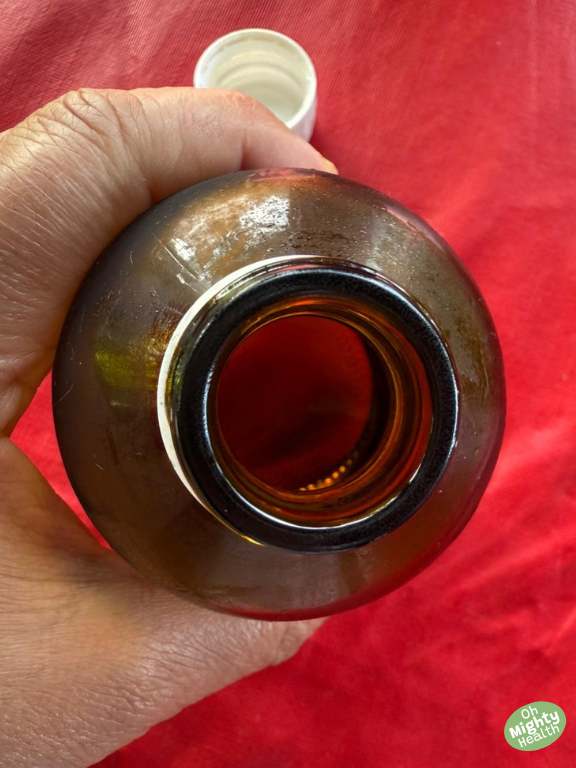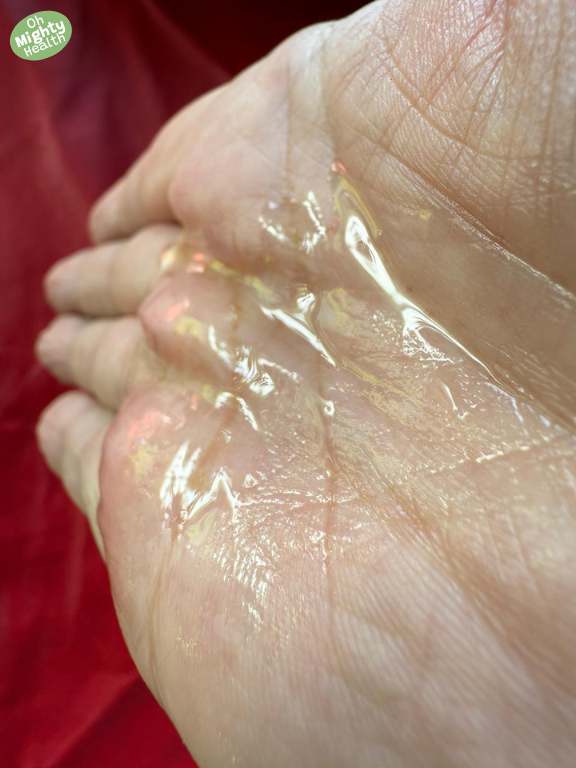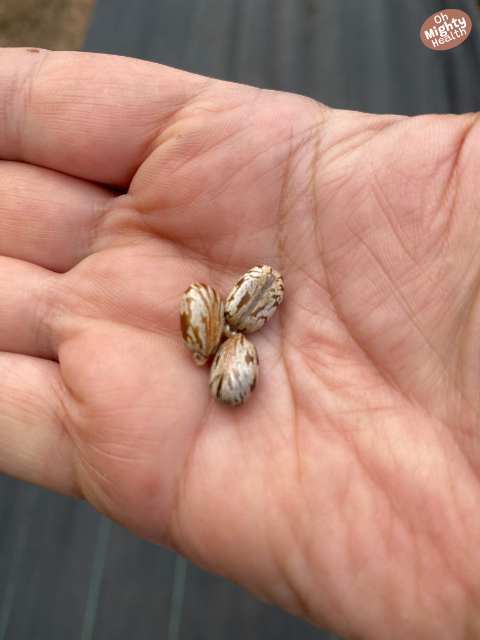Castor oil for hair: what it really does (and doesn’t!)
Everywhere I look, people are talking about castor oil for hair.
They say it makes hair thicker, stronger, and shinier. But does it really work, or is it just another trend?
I’ve been looking into natural hair treatments, and castor oil is one I’m curious about.
In this article, I’ll have a good look into the world of castor oil for hair.
I’ll separate fact from fiction and look at the science behind its benefits.
We’ll explore its chemical makeup (if you’ve been here before you know this is something I’m VERY INTERESTED in!) and historical use in hair care.
I aim to find out if it’s worth the hype and what it can do for your hair.
DISCLAIMER: I link to affiliate products below. If you purchase through my links I might earn a commission at no extra cost to you.
Is Castor Oil A Natural Hair Care Solution?
Castor oil comes from the castor oil plant and is packed with antioxidants and fatty acids. And, yes, these nutrients are GREAT for hair health.

So, what makes castor oil special? It’s known for nourishing and moisturising hair and scalp. This CAN promotes healthy hair growth.
Its ricinoleic acid and fatty acids also soothe the scalp, reducing irritation and dandruff. I wrote a detailed article on the components inside castor oil and what makes it so special, check it out here.
(Below, we will look in detail about castor oil for hair growth but I feel we need to discuss types of castor oil and some of the science behind its benefits first).
Types of Castor Oil for Hair

- Cold-pressed castor oil – Extracted without heat to preserve its natural nutrients, making it great for hair growthand scalp health.
- Refined castor oil – More processed, losing some of its nutrients, but still effective for hair masks and treatments.
- Jamaican black castor oil – Made by roasting castor beans, giving it a darker colour and smoky scent. Ideal for thicker, coarser hair and scalp care. (Read here my article on Jamaican castor oil vs regular castor oil).
I recommend cold-pressed castor oil for the purest, most nutrient-rich option, perfect for hair growth and scalp health (I RECOMMEND THIS REGULAR CASTOR OIL).
If you prefer a heavier, more penetrating oil and have thicker, coarser hair, Jamaican black castor oil (which is also nutrient-rich but processed differently) may be a better choice. (I RECOMMEND THIS JAMAICAN BLACK CASTOR OIL).
Both are effective—just pick based on your hair’s needs.
By the way, please always choose organic castor oil as it is always the better choice because it’s grown without pesticides or chemicals (a pure, toxin-free option for your hair care routine!).
The Science Behind Castor Oil’s Hair Benefits

So, does castor oil REALLY make hair thicker and stronger?
Let’s break it down.
The biggest reason castor oil gets hyped for hair growth is because it boosts blood flow to the scalp. Better circulation means more nutrients reaching hair follicles, which could lead to stronger, healthier hair. And yes, even more growth.
That’s not all. Its anti-inflammatory properties may help calm scalp irritation and reduce hair loss. Plus, some research suggests it nourishes follicles, keeping your scalp in top shape (the foundation for thicker, fuller hair).
So, does castor oil guarantee crazy hair growth? Not exactly. But it creates the right conditions for stronger, healthier strands. In my opinion as a skincare formulator, that’s a PRETTY BIG deal.
(By the way, an interesting reason castor oil may support hair growth is that it helps increase PGE2 levels, a molecule linked to hair follicle activation and regeneration – Link to study)

Here are some potential benefits of using castor oil for hair:
- Improves hair strength and reduces breakage
- Enhances hair growth and thickness
- Nourishes the hair follicles and scalp
While the science looks good, remember that everyone’s hair is different. What works for one might not work for another.
Historical Use of Castor Oil in Hair Care
Castor oil has been a hair care staple for centuries. From ancient Egypt to modern-day India, it’s been used to nourish the scalp, strengthen strands, and even promote hair growth.
Different cultures have their own ways of using it—some apply it before shampooing for deep moisture, while others use it as a finishing touch for added shine. Ayurvedic medicine and African hair care traditions have long valued it for its conditioning and protective properties.

Even today, castor oil remains a go-to for natural hair treatments. Knowing its rich history makes it even more impressive… This isn’t just a trend; it’s a time-tested hair care essential.
HERE IS THE CASTOR OIL I RECOMMEND FOR HAIR CARE.
How to Apply Castor Oil to Your Hair
Because castor oil is THICK and VERY STICKY, applying it the right way makes all the difference.
Step-by-Step Application:
You should apply castor oil to dry hair for the best results. Why? Oil and water don’t mix well, so applying castor oil to wet hair can make it harder to absorb. On dry hair, it spreads more evenly and penetrates the scalp better. Remember: applying it to dry hair and scalp will give you the most benefits.
1️⃣ Warm the Oil – Rub a small amount between your palms or place the bottle in warm water for a few minutes. This makes it easier to spread.
2️⃣ Section Your Hair – Divide your hair into sections to ensure even coverage.
3️⃣ Apply to Your Scalp – Massage the oil into your scalp using circular motions. This helps improve blood flow and stimulate hair growth.
4️⃣ Distribute Through Hair (Optional) – If your hair is very dry, rub a small amount between your hands and lightly smooth it over the lengths and ends.
5️⃣ Leave it On –
- For a deep treatment, leave it on for at least 1 hour (or overnight for maximum benefits).
- To make it easier to spread and wash out, mix it with coconut, olive, or jojoba oil.
6️⃣ Wash it Out – Since castor oil is thick, you may need to shampoo twice. Use a mild shampoo and follow up with a hydrating conditioner.
Extra Tips:
✔ Use sparingly – Too much can be hard to wash out.
✔ Focus on the scalp – Applying too much to the ends can make hair greasy and heavy.
✔ Repeat 1–2 times a week – For best results, be consistent.
You can use for at least 3 months to start seeing noticeable results in hair growth, thickness, and scalp health. Why 3 months? Hair grows in cycles, and consistent use over a few months helps nourish the follicles and support new growth.
✔ If using for dryness or scalp health, you may see results sooner (in 4–6 weeks).
✔ If using for hair growth or thickness, stick with it for at least 3–6 months for the best results.
Try to track your progress with photos to see how your hair improves over time.
Potential Side Effects and Precautions
Using castor oil for hair care comes with some risks, so it’s important to be aware of potential side effects and take precautions.
While many people love castor oil for its nourishing properties, it can cause unwanted reactions if not used correctly.
1. Possible Side Effects:
- Skin irritation – Castor oil is thick and occlusive, which can trap bacteria or irritants, leading to redness, itching, or breakouts.
- Scalp buildup – The heaviness of castor oil can clog pores, leading to dandruff, greasiness, or even hair shedding if not washed out properly.
- Allergic reactions – Though rare, some people may experience redness, swelling, itching, or a rash after using castor oil.
2. Precautions to Take:
- ALWAYS do a patch test first – Apply a small amount behind your ear or on your inner forearm and wait 24-48 hours to check for any irritation before using it widely.
- Dilute with a lighter oil – Mixing castor oil with a carrier oil like jojoba or coconut makes it easier to apply and reduces the risk of buildup.
- Avoid if you have scalp conditions – Those with seborrheic dermatitis, fungal infections, or sensitive scalps should use castor oil with caution, as it may worsen symptoms.
If you experience itching, redness, or increased hair shedding, stop using castor oil and wash your scalp thoroughly.
(People with sensitive skin or scalp issues should not use castor oil or at least do make sure to patch-test before using!).
Combining Castor Oil with Other Hair Care Ingredients
Yes, castor oil on its own IS amazing. But, mix it with the right ingredients and you’ll hit next-level hair care.
Coconut oil, argan oil, shea butter… these all pair perfectly with castor oil to boost moisture, fight frizz, and strengthen your strands.
- Coconut oil adds deep hydration and helps penetrate the hair shaft, making it great for dry or damaged hair.
- Argan oil is packed with vitamins and antioxidants, helping to reduce frizz and add shine.
- Shea butter provides intense nourishment and protection, sealing in moisture and keeping hair soft.
A little experimenting can help you find the best combo for your hair, whether you need extra hydration, strength, or smoothness.
Why mix castor oil with other ingredients?
✔ Extra hydration to keep hair soft and healthy
✔ Stronger strands that grow longer and break less
✔ Less frizz, fewer split ends for smoother hair
✔ Deep nourishment for that glossy, healthy look
Everyone is different, so it might take some trial and error to find your perfect blend.
But trust me, take your time in experimenting and finding what you love because when you do, your hair will look glorious!
Best Hair Types for Castor Oil Treatment
Castor oil works wonders for some hair types but isn’t a perfect match for everyone.
Whether it helps or weighs your hair down can also depend on your hair texture and scalp condition.
Let me try to give you a hand with this.
1. Hair Texture & Castor Oil
- Coarse hair – Deeply moisturizes and softens, making it easier to manage.
- Curly hair – Defines curls, reduces frizz, and keeps hair looking vibrant.
- Wavy hair – Adds shine and enhances texture for a lively, healthy look.
- Fine or oily hair – Can be too heavy and may make hair look greasy—use sparingly!
2. Scalp Condition & Castor Oil
- Dry or flaky scalp – Can help soothe dandruff, reducing itchiness and flakiness.
- Sensitive scalp – Always patch test first to avoid irritation.
- Oily scalp – Might feel too heavy—apply only to the ends if needed.
How Long Before Seeing Results?
Using castor oil for hair care makes you wonder when you’ll see castor oil results.
The hair growth timeline varies based on hair type and scalp health. You might notice changes in a few weeks with regular use.
Here’s what you can expect:
- Within 2-4 weeks: Improved scalp health and reduced dandruff
- Within 6-12 weeks: Noticeable improvement in hair growth and thickness
- Within 12 weeks: Significant improvement in hair strength and reduced breakage
Remember, these are general guidelines!
The hair growth timeline can differ for everyone.
Being consistent and patient is crucial when using castor oil as a natural hair treatment.
With regular application, you’ll see positive castor oil results over time.
HERE IS THE CASTOR OIL I RECOMMEND FOR HAIR CARE.
Alternative Natural Hair Growth Solutions
Some castor oil alternatives are rosemary essential oil and coconut oil. You can use them alone or with castor oil to help hair grow.
For example, rosemary essential oil can be mixed into shampoo or used as a hair mask.
Here are more natural hair growth solutions to consider:
- Coconut oil: rich in nutrients and antioxidants to nourish your hair
- Argan oil: hydrates and protects your hair from damage
- Vitamin E oil: promotes hair growth and reduces hair loss
These alternative solutions can be used in different ways. Try them as pre-shampoo treatments, hair masks, or leave-in conditioners.
Conclusion: Is Castor Oil Worth Your Time and Money?
The big question is: is it worth it?
The answer seems yes, as it can be a great addition to your hair care.
But, it really depends on your hair type and scalp.
Castor oil can help with hair growth, strengthen strands, and add shine.
But, how much it helps can vary.
Those with dry, brittle, or damaged hair often see big improvements.
Yet, for oily scalps or fine, delicate hair, castor oil might not be the best choice…
Whether to use castor oil is up to you.
First, do a patch test to see if it works for you. With regular use, you might be amazed at how your hair changes.
So, if you want a natural way to improve your hair, castor oil is worth trying.
HERE IS THE CASTOR OIL I RECOMMEND FOR HAIR CARE.
FAQ
What is castor oil?
Castor oil comes from the seeds of the castor oil plant. It’s full of antioxidants, fatty acids, and nutrients good for hair.
What are the different types of castor oil for hair?
You can find different castor oils for hair, like cold-pressed, refined, and organic. Each type has its own benefits.
How does castor oil work for hair growth and thickness?
Castor oil boosts blood flow, reduces inflammation, and gives hair the nutrients it needs. This helps hair grow thicker and healthier.
What is the historical use of castor oil in hair care?
People have used castor oil for hair for centuries. It’s been a part of ancient Egyptian and modern Indian hair care.
What are the proven benefits of using castor oil for hair?
Castor oil can help with dandruff, keep the scalp healthy, and even make hair grow thicker over time.
What are some common myths and misconceptions about castor oil for hair?
Some myths say castor oil can magically change hair. But, not all claims are backed by science.
How should I apply castor oil to my hair?
To use castor oil, prepare your hair first, apply it as a mask, and then care for it afterwards. The method depends on your hair type.
What are the potential side effects and precautions to consider when using castor oil?
Using castor oil might cause skin irritation or allergic reactions. It’s also not good for some scalp conditions. Always do a patch test first.
Can I combine castor oil with other hair care ingredients?
Yes, mixing castor oil with coconut oil or argan oil can make your hair even healthier.
What types of hair are best suited for castor oil treatment?
Castor oil works differently for everyone. It’s best for certain hair types and scalp conditions. Think about what’s best for your hair.
How long does it take to see results from using castor oil for hair?
Results from castor oil can take a few weeks to a few months. Consistency is key to seeing long-term benefits.
Are there any alternative natural hair growth solutions to consider?
Yes, you can try other natural oils like rosemary essential oil or biotin supplements. They can work alongside or instead of castor oil for healthy hair growth.

